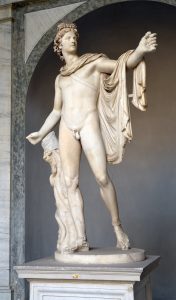
Apollo, one of the most revered gods in Greek mythology, embodies the ideals of light, harmony, and divine artistry. As the son of Zeus and Leto, and twin brother to Artemis, Apollo’s influence spans prophecy, music, healing, archery, and the sun. His myths reflect both his benevolence and his complexity, illustrating the duality of creation and destruction inherent in his power.
Born on the floating island of Delos—a refuge granted to his mother, Leto, by Zeus to escape Hera’s wrath—Apollo’s birth marked the arrival of a god destined for greatness. By the age of four days, he slew the serpent Python at Delphi, claiming the sacred site as his own. There, he established the Oracle of Delphi, where the Pythia channeled his prophecies, guiding kings and heroes for centuries.
Apollo’s lyre, a gift from Hermes, symbolizes his mastery over music and poetry. He led the Muses, inspiring artists and thinkers, yet his wrath could be fierce. When the satyr Marsyas challenged him to a musical contest, Apollo’s victory led to Marsyas’ gruesome punishment, underscoring the god’s unforgiving pride.
As the god of healing, Apollo taught mortals medicine through his son Asclepius, yet he also wielded disease, exemplified by the plague he inflicted on the Greeks in Homer’s *Iliad*. His archery skills, symbolized by his silver bow, protected order but could unleash calamity.
Apollo’s association with the sun emerged later, merging with earlier solar deities. He drove the golden sun chariot across the sky, bringing light and life. His love life, however, often ended tragically. The nymph Daphne transformed into a laurel tree to escape him, while the Spartan prince Hyacinthus died in a discus accident, immortalized as a flower.
Worshiped widely, Apollo’s temples, like Delphi’s iconic sanctuary, became centers of culture and spirituality. The Pythian Games, held in his honor, celebrated athletic and artistic prowess. The laurel wreath, his sacred symbol, crowned victors and poets, linking triumph to intellectual and creative achievement.
Apollo represents the Classical Greek ideal: a blend of physical perfection, rational thought, and artistic genius. His legacy endures as a symbol of enlightenment, bridging humanity’s quest for knowledge and the divine mysteries of the cosmos. In him, the ancient Greeks saw their aspirations reflected—a god who transcended chaos with reason and beauty.